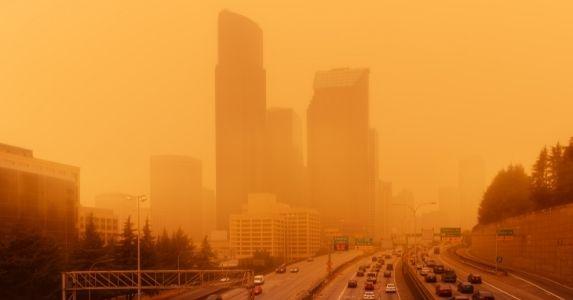Widespread Wildfires Cause Severe Air Pollution Across Several Areas
Ongoing wildfires across multiple states have generated dense smoke clouds, significantly degrading air quality to levels classified as hazardous. This has triggered health warnings and travel advisories, urging residents—especially vulnerable groups like children, seniors, and those with respiratory illnesses—to minimize outdoor exposure. The poor air conditions have disrupted daily life, leading to cancellations of outdoor school activities and distribution of protective masks by local agencies to reduce inhalation of harmful pollutants.
Compounding the issue,meteorological reports forecast sustained heat waves that will elevate temperatures well above normal for this time of year,intensifying wildfire risks and prolonging poor air quality. Below is a summary of expected weekend temperatures alongside air quality indices and health recommendations for key affected regions:
| Region | Projected Weekend High (°F) | Air Quality Index | Health Advisory |
|---|---|---|---|
| Pacific Northwest | 95 | 225 (Hazardous) | Remain Indoors |
| Southwestern States | 103 | 185 (Unhealthy) | Limit Outdoor Exposure |
| Central Valley | 100 | 210 (Very Unhealthy) | Utilize Air Filtration |
| Southeastern Regions | 97 | 180 (Unhealthy for Sensitive Groups) | Minimize Exposure |
- Regularly check local air quality updates.
- Wear N95 respirators when outdoor presence is necessary.
- Avoid intense physical activity outdoors during peak heat hours.
- Maintain hydration and seek refuge in climate-controlled spaces.
Escalating Heat Amplifies Health Dangers Amid Persistent Smoke Haze
As temperatures climb beyond seasonal norms, the combined effects of extreme heat and continuous wildfire smoke are heightening health hazards throughout affected communities. Those most at risk include older adults, young children, and individuals with chronic respiratory or heart conditions. Medical experts caution that prolonged exposure to both elevated temperatures and airborne particulates can result in serious health issues such as heat exhaustion, aggravated asthma symptoms, and impaired pulmonary function.
Critical health concerns for residents during these conditions include:
- Heat-related dehydration and heatstroke: Elevated temperatures increase bodily stress,especially when respiratory systems are compromised by polluted air.
- Surge in emergency medical visits: Hospitals anticipate increased admissions due to respiratory distress and heat-induced illnesses, as reported in recent investigations into heat-related fatalities linked to extreme heat events.
- Reduced outdoor engagement: Public health advisories recommend limiting time spent outside, especially during the hottest parts of the day when smoke density peaks.
| Health Concern | Contributing Factor | Preventive Measures |
|---|---|---|
| Heat Exhaustion | Elevated Temperatures | Stay hydrated,remain in cool environments |
| Respiratory Complications | Smoke Particulates | Use air filtration devices,wear protective masks |
| Cardiovascular Stress | Combined Heat and Air Pollution | Avoid heavy physical exertion |
Health Experts Advocate for Reduced Outdoor Activity Among Sensitive Groups
Medical authorities strongly advise that individuals with pre-existing lung conditions,seniors,and young children exercise heightened caution during this period of intense wildfire smoke and soaring temperatures. Exposure to polluted air can worsen conditions such as asthma, chronic bronchitis, and cardiovascular disease.Experts recommend staying indoors as much as possible, employing air purifiers, and refraining from strenuous outdoor activities to minimize inhalation of hazardous particles.
Essential precautions include:
- Sealing windows and doors to block smoke entry.
- Operating air conditioning units in recirculation mode to filter indoor air.
- Wearing well-fitted N95 masks when outdoor exposure cannot be avoided.
- Keeping abreast of local air quality index (AQI) reports.
| Demographic | Risk Level | Recommended Precaution |
|---|---|---|
| Children under 12 years | High | Restrict outdoor playtime, use air purifiers indoors |
| Adults 65 and older | Very High | Remain indoors, avoid physical exertion |
| Individuals with respiratory illnesses | Critical | Adhere to medical guidance, wear masks outdoors |
| General population | Moderate | Limit outdoor activities, stay well hydrated |
Community Guidance Amid Ongoing Heatwave and Smoke Conditions
With temperatures remaining elevated and wildfire smoke continuing to degrade air quality, local officials have issued urgent recommendations to protect public health. The combination of extreme heat and polluted air is particularly harmful to sensitive groups, including children, the elderly, and those with respiratory ailments.Authorities advise minimizing outdoor exposure during the hottest hours and ensuring sufficient fluid intake.
Recommended safety measures from public health officials include:
- Remaining indoors in air-conditioned spaces whenever feasible.
- Utilizing air purifiers or keeping windows and doors closed to limit smoke intrusion.
- Wearing particulate-filtering masks if outdoor presence is necessary.
- Regularly monitoring air quality updates to stay informed.
- Checking on at-risk neighbors and family members to ensure their safety.
| Time Frame | Suggested Activity Level | Air Quality Index (AQI) |
|---|---|---|
| 6 AM – 10 AM | Moderate (Light outdoor activity permitted) | 85 (Unhealthy for sensitive groups) |
| 10 AM – 4 PM | Low (Minimize outdoor exposure) | 115 (Unhealthy) |
| 4 PM – 8 PM | Moderate (Cautious outdoor activity) | 95 (Moderate) |
| 8 PM – 6 AM | Low (Safe indoors for most) | 75 (Moderate) |
Final Thoughts on Wildfire Impacts and Health Safety
As wildfires persist across the region, air pollution levels are expected to remain dangerously high, posing ongoing health threats to susceptible populations.Weather experts predict that above-average temperatures will continue through the weekend, further intensifying the challenges posed by smoke and heat. Residents are strongly encouraged to stay vigilant, follow official health guidance, and take proactive measures to protect themselves and their communities during this critical period.










